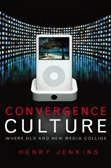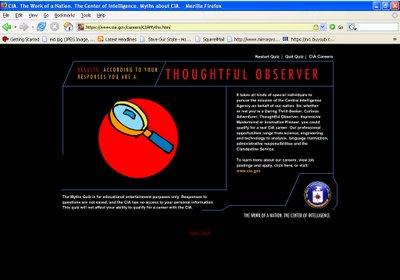 Henry Jenkins
Henry Jenkins' new book on media publics,
Convergence Culture: Where Old and New Media Collide, is generating some lively discussion in the blogosphere this week.
Ian Bogost of Georgia Tech and the persuasive gaming blog
Water Cooler Games wrote a long, mostly positive
review of the book, although it did take Jenkins to task for promoting a libertarian ideology that assumed that markets were inevitably self-correcting mechanisms that could effectively govern the public sphere and for promulgating an uncritical acceptance of the ideology of lifestyle marketing without considering its troubling causes and effects.
This week Jenkins has been responding to Bogost in his own blog, in a comprehensive series of three-part installments (1, 2, 3) that rebut some of Bogost's central assertions.
I'm wary of stepping into the discussion, because -- as Jenkins himself said -- Bogost sets a "high bar for debate," but I also think that it's a book that more people should be talking about, so I'll butt into their conversation with a few points of my own. Certainly, like Bogost, I think it's a book that people should read. The style is accessible, and Jenkins clearly hopes to reach a lay audience. In fact, I was sorry to see that more public libraries, including the one from my own relatively enlightened city, don't yet carry it on their shelves.
In short, too many New Media titles merely apply preconceived theoretical concepts and jargon from other disciplines (such as Literary Theory or Film Theory) to phenomena specific to digital culture. Or they devote hundreds of pages to rarefied aesthetic objects like art exhibits in small galleries or hypertext fiction with Joycean vocabularies. This self-satisfied opacity may explain the blistering sentiments in the recent "immersion Unexplained: Why do we lose ourselves in games? Don't ask a humanities professor" essay, which ran in The Escapist.
Convergence Culture avoids both these pitfalls and presents a powerful explanatory theory that I've been finding useful for interpreting items in the news about current media practices practically on a daily basis to clarify everything from teen media grazing to blogger bloodlust to transmedia mash-ups. Although Jenkins has complained about how difficult it can be to "break out of the academic ghetto," given the long production schedules of academic presses, in almost every chapter I was impressed to see the recent, apt example that I wanted to add mentally to Jenkins' prose magically materialize in the print on the very next page. I would also predict that Convergence Culture will stand the test of time and continue to be on the shelf with standards like James Paul Gee, Lawrence Lessig, Lev Manovich, Bruno Latour, Manuel Castells, Siva Vaidhyanathan, and Eric S. Raymond. I was also wowed by the breadth of his cultural literacy and the book's delightful quirkiness that included some of my favorite Virtualpolitik topics (Cantina Crawls! Lovemarks!) that made for a real virtuoso performance.
Of course, I liked the book's rhetorical focus most of all and its insightful readings of both fan and corporate discourses with attention to teasing out subtleties in purpose or in the surrounding rhetorical scene. Too many critics who write about digital media discount the importance of rhetoric (Manovich) or revile it as a dirty word associated with institutions of power (Lessig). Of course, this affinity with rhetorical interpretations is something that both Bogost and Jenkins share.
Convergence Culture is a book about the impact of grassroots fan communities on entrenched institutions in entertainment, education, and government, which asserts that spectators perform important work (and play) in the new media cultural system. It uses three catchphrases frequently: 1) "media convergence," 2) "participatory culture," and 3) "collective intelligence." It attacks techno-centric readings that focus on gadgets rather than social practices, particularly those associated with the "black box fallacy" in which all our media will allegedly be coordinated by a single device in the future. Instead it focuses on the importance of "transmedia" worlds in which large franchises, such as Star Wars or Harry Potter or The Matrix extend narratives and characters across several media platforms.
As an advocate for the importance of public institutions in my professional life, first in social services and now in higher education, I would agree with Bogost that Jenkins' latent libertarianism could exacerbate existing hostility to traditional, secular civic culture. I have to admit that Jenkins' positive plugs for homeschooled children and homeschooling more generally sounded like nails on a chalkboard to me.
On the other hand, sometimes I felt like he wasn't libertarian enough in defending the rights of the individual. For example, I liked the fact that Jenkins connected copyright restrictions to free speech issues in the chapters on Star Wars and on Harry Potter, but I still thought that he was probably underestimating the risk to the First Amendment posed by proprietary corporate interests (and the risk to individual privacy as well). Moreover, some of the material about democracy at the end felt tacked on, particularly in comparison to his earlier rigorous exploration of the norms of fan culture around shows like American Idol and Survivor. If Jenkins wants to reach a broader audience, I think this is particularly unfortunate, since he's been an important advocate for the digital rights of individuals against short-sighted and hegemonic regulatory approaches from Congress.
It also seemed naive to me to ignore the fact that media convergence can also be incredibly restrictive to creative production. Ask any television writer who has been forced to insert an irrelevant brand name into a scene in the interests of product placement. It's one area that my friend Patric Verrone, President of the Writers Guild, has put on the top of the group's labor agenda.
Media convergence can restrict consumer choices in the lifeworld as well. Would Jenkins cheer the deal that the Pepsi corporation has made with my campus for exclusive distribution rights over all beverages? How much power do I actually have as a consumer against their quest for corporate synergy? I shouldn't go for culture jamming, and I can't stop drinking water. Should I seek out a fan group of Coke to solve my problem?
Moreover, by fighting so hard against technological determinism, I also sometimes felt that Jenkins wasn't "techie" enough, given the book's subject matter. As Lev Manovich points out, when you are talking about new media, technological constraints and characteristics of algorithms matter. "Transmedia" is important but so is "transcoding." For example, technology prevents certain forms of social interaction in virtual space, such as modeling complicated kinds of crowd behaviors or paralinguistic cues that require dexterous avatars. Furthermore, as Bogost points out, certain kinds of operations are procedural rather than narrative at the core.
Perhaps I am splitting hairs of terminology, but I would have also liked to have seen "information" and "knowledge" used a little more precisely, in the interest of fitting the work into what Siva Vaidhyanathan has called Critical Information Studies more productively and the broader efforts of media scholars to join with computer scientists, anthropologists, lawyers, and librarians to make their disciplinary and interdisciplinary work more relevant and collaborative. It seems like information itself is often the main cultural object that is given, bartered, or traded by these fans, and the fact that their information economy functions so differently from the knowledge economy that produces these entertainment commodities seems a significant point on which Jenkins spends surprisingly little time.
We love Jenkins over at Sivacracy, but I'd probably be considered a "critical pessimist" in Jenkins "utopian" terms, by virtue of my anxieties about the consolidation of media mega-monopolies and the invasion of the advertising industry into government service. So I really resented being lumped in there with "Noam Chomsky" after patiently -- and otherwise happily -- reading to the conclusion of the book. In particular, I thought that the off-handed dismissal of culture jammers didn't serve an otherwise thoughtful book very well at the end.
Finally, as a lurker and occasional participant in the DIY project that Julia and Ellen Lupton are articulating, I don't think those of us who chose the home-made over the slick, corporate-designed product are missing out on anything. There are a lot of people who choose to be their own brand rather than support someone else's brand and tell life stories instead of mass media stories. These grassroots forms of association that celebrate open-source, non-profit, and bottom-up media ventures can be just as fulfilling as fan culture, if not more so.
That said, I wasn't sure that all of Bogost's criticisms were entirely fair. First, as a fault-tolerant writing instructor, I winced when he nailed Jenkins with his Lord of the Rings related "Gandalf"/"Gandolf" typo, given that I saw that same misspelling on a sign on the front door of a fan merchandise store in Marina Del Rey on Tuesday. (Jenkins' confusion of Jane McGonigal's "alternate reality" and "alternative reality," on the other hand, was a significant mistake that would have been good to have caught before press time.) Second, Bogost draws on the legendary Narratology vs. Ludology wars in the mythological recent past of Game Studies to characterize Jenkins as a one-sided soldier of "story" rather than of interactive play. Jenkins certainly must have had some investments in those debates, given the publications in which his work appears, but it's a conflict that many people are much less engaged with now (including, I might argue, Bogost himself), which is good for the field because it opens up the discussion to a lot of research that also studies analogous information ecologies for which that dichotomy isn't very meaningful. For example, I wrote about government websites and national digital libraries before I became interested in government-funded videogames. Third, Bogost points out that the participation pyramid, in which there are far more spectators than purposive actors in a given media system, disproves Jenkins democratic model of fan culture. Bogost is right that it may not be a democratic structure, but the competing models for how social networks function are a lot more complicated (and efficient in their distribution) than a pyramid, as the primer on network theory Linked demonstrates.
On the other hand, I thought that some of Jenkins' implications about Bogost's personal interests and prejudices indicated that a strange misreading had taken place or that he was responding to objections from an "academic" other than Bogost, who himself has a reputation both for demonstrating the social value of games dismissed by others as offensive or trivial and for his own participation in collector cultures around eighties videogame memorabilia. It's one of the aspects that I found perplexing both when Jenkins is addressing his imaginary critics in the book and when he does so in his blog. To assume that his ideas are being criticized because the person doesn't like Lost or doesn't take American Idol seriously seems way, way, way off base. Now I'm wondering if what I thought was an odd reading of Benjamin might have something to do with some of these assumptions about the supposed divide that theorists cherish between high and low culture.
Personally, I don't have many of the objections to valuing popular culture that Jenkins seems to anticipate. I accept some of his stretchier analogies quite willingly, such as the Odyssey / Matrix comparison, a claim which he devoted several paragraphs to qualifying. As the Writing Director of the Humanities Core Course, my colleagues and I make those kinds of comparisons all the time. (My favorite was from Julia Lupton, who compared Book V of the Odyssey to Baywatch.) As a compositionist, I certainly don't fetishize "originality" in creative production either, and in my profession this is now the standard view, because discursive models and rhetorical templates are recognized to be necessary to any apprentice writer or artist. Furthermore, I'm an academic, but like Bogost I've also attended fan events, like those for videogames, comic books, guns, tattoos, and erotica, and I certainly don't feel I've been contaminated by the experience.
Of course, speaking as a reader of both their works, considering that they BOTH wrote about the 2004 elections in their books, I'd also like to see them in dialogue about the Dean campaign.
These criticisms aren't intended to attack Jenkins, who does a huge amount of admirable work at the MIT Comparative Media Studies program. He and the younger scholars he has mentored have done a valuable service by reminding other researchers about the importance of paying attention to social dynamics, particularly in the high-stakes field of the education of children and possible pedagogical applications for distance learning and interactive technologies. At a time when so many legislators are discounting minors as sentient beings and seeking to forbid their file-sharing, social networking, and videogame play, Jenkins does work that takes the digital generation seriously and doesn't get distracted by the gleam of gee-whiz technology while he's at it.
It seems appropriate to be discussing fan culture, since this weekend is annual Star Trek convention, which was the first fan event I ever attended as a kid. Franchise fans are actually continuing the show on digital video, and big corporations like Google are participating in the event this year.
Labels: alternate reality games, book reviews, consumerism, participatory culture








